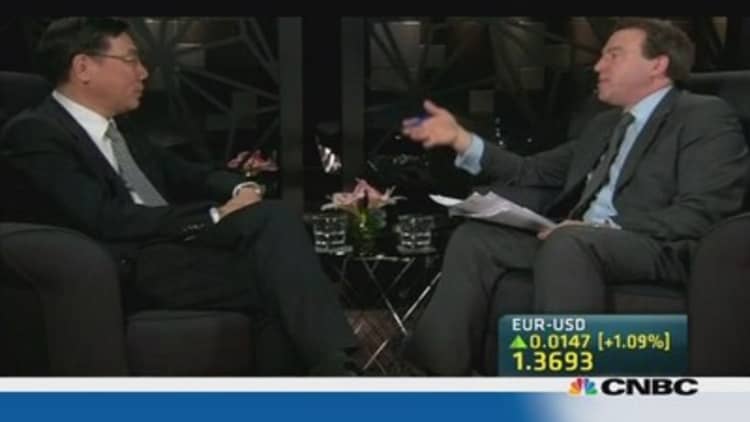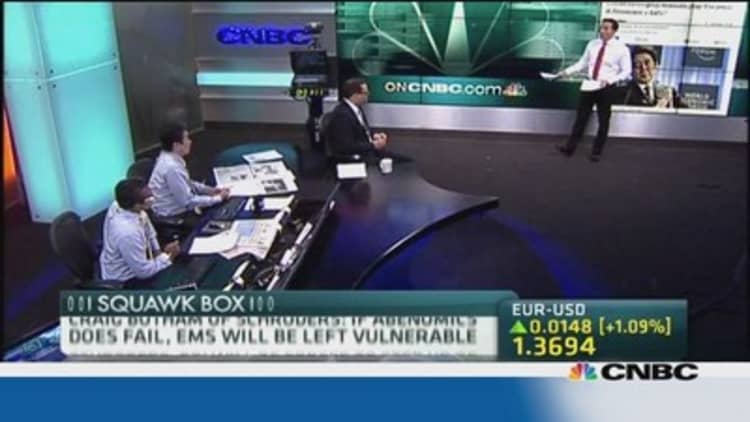Asian equities were mostly lower on Friday, as Thursday's contractionary reading on HSBC's flash Chinese Purchasing Managers' Index (PMI) and disappointing corporate earnings weighed on trading sentiment.
Nikkei drops 2%
Japanese shares extended Thursday's losses. The fell to a one-month low of 15,288 earlier in the session on the back of a stronger yen at a two-week high.
"Sentiment was already poor because of the poor U.S. jobs data released early this month, and it was exacerbated by the Chinese figures. The market is very cautious about the next U.S. jobs data to be released in two weeks. If the market is disappointed again, the Japanese market may enter a correction phase," said Naoki Kamiyama, head of Japan equity strategy at Bank Of America Merrill Lynch according to Reuters.
(Read more: Emerging markets topay the price if Abenomics fails?)
Top losers include Daiichi Sankyo, which tumbled 6.4 percent, after its Indian subsidiary Ranbaxy Laboratories received further bans from the U.S. Food and Drug Administration.
Electric stock Yaskawa Electric plunged more than 6 percent, while Mitsubishi Electric lost nearly 4 percent.
Shanghai up 0.6%
Chinese shares rebounded from Thursday's loss, posting their first weekly gain in a month.
Financial and property stocks led the surge as investors looked for bargains after liquidity concerns eased. Vanke rallied 4 percent, Poly Real Estate added 3 percent while Hua Xia Bank gained 1.2 percent.

Industrial and Commercial Bank of China (ICBC), which was in the news on Thursday after denying compensation to investors for losses related to a fund product marketed by the lender, traded unchanged.
Hong Kong shares however extended a second day of losses. The benchmark Hang Seng index lost 0.8 percent.
(Read more: China must accept global banking standards: Ex-UK PM)
Australia down 0.4%
After a dismal showing on Thursday following poor Chinese data, Sydney shares slipped further, closing at a one-and-a-half week low of 5,240. Declines in banking stocks contributed to the fall; Australia and New Zealand Banking, National Australia Bank and Westpac lost 1 percent each.

Gains in mining stocks however buffered the losses. Gold stocks took the biggest share of gains on the back of firmer bullion prices; Endeavor Mining advanced almost 10 percent while Kingsgate rallied over 6 percent.
Meanwhile, the Aussie fell to a fresh three-and-a-half-year low of 87 U.S. cents on Friday. This was after Reserve Bank of Australia (RBA) board member Heather Ridout was reported as saying the currency had not fallen enough and said the Aussie dollar at 80 U.S. cents would be a 'fair deal' for the economy.
(Read more: Is the bubble trouble in Australia housing overblown?)
Traders also digested Prime Minister Tony Abott's comments about promoting free trade via Australia's G20 presidency and curbing corporate tax avoidance at the World Economic Forum on Thursday
Kospi down 0.4%
South Korean shares closed at a two-week low on Friday, on the back of disappointing earnings results.
Hyundai Motor lost more than 1.7 percent after the automaker posted its first year-on-year decline in quarterly revenue in nearly three years on Thursday.
(Read more: Thai rice subsidies: damned if you do, and don't)
Also facing poor earnings results was Samsung but the electronics giant managed to gain 0.6 percent despite posting its slowest profit growth in two years.
Kia Motors shed 1.1 percent, despite seeing a 29 percent jump in quarterly profits thanks to increased sales for its pricier models.
Emerging markets mixed
Thailand's benchmark SET index was in the green for the third consecutive day despite continued political unrest. Meanwhile, Indian shares plunged 0.9 percent after Ranbaxy Laboratories, owned by Japan's Daiichi Sankyo, slumped nearly 20 percent.
— By CNBC.com's Tang See Kit.

